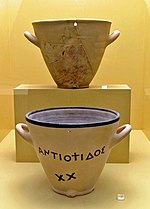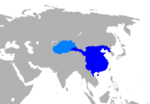Traditional Chinese timekeeping refers to the time standards for divisions of the day used in China until the introduction of the Shixian calendar in...
37 KB (2,468 words) - 20:08, 15 September 2024
Pig (zodiac) (redirect from Pig (Chinese zodiac))
S.-China Institute collected stamps from 56 jurisdictions. Chinese astrology Chinese calendar correspondence table Traditional Chinese timekeeping Burmese...
13 KB (1,307 words) - 04:42, 11 May 2024
The modern 24-hour clock is the convention of timekeeping in which the day runs from midnight to midnight and is divided into 24 hours. This is indicated...
22 KB (2,673 words) - 19:04, 9 November 2024
(2005). Zhongguo ren de sui shi wen hua 中國人的歲時文化 [Timekeeping of the Chinese culture] (in Chinese). 岳麓書社. pp. 195. ISBN 978-7-80665-620-4. "数九从哪一天开始到哪一天结束...
91 KB (9,601 words) - 01:44, 18 November 2024
hours of usage hour hand or hour, a arm on a clock Chinese hour in traditional Chinese timekeeping Canonical hours or liturgical hours, divisions of the...
4 KB (590 words) - 21:29, 10 October 2024
zodiac is very important in traditional Chinese culture and exists as a reflection of Chinese philosophy and culture. Chinese folkways held that one's personality...
61 KB (4,457 words) - 17:50, 21 November 2024
smartphones and smartwatches have become the most common timekeeping devices. The most accurate timekeeping devices in practical use today are atomic clocks,...
102 KB (11,591 words) - 17:00, 6 November 2024
down. Example cities across the globe @000 BEATS midnight: Traditional Chinese timekeeping – 1 kè = 10 'beats' Metric time New Earth Time Unix time at...
11 KB (1,136 words) - 16:13, 17 November 2024
Japanese clock (redirect from Traditional Japanese time system)
adapting the European mechanical clock technology to the needs of traditional Japanese timekeeping. Clocks have existed in Japan since the mid-7th century AD...
16 KB (1,879 words) - 17:18, 31 October 2024
Clock (redirect from Timekeeping device)
with oscillating timekeepers like balance wheels. Traditionally, in horology (the study of timekeeping), the term clock was used for a striking clock, while...
96 KB (11,210 words) - 06:34, 14 November 2024
Symbolic stars (category Articles containing Chinese-language text)
interactions of the heavenly stems and earthly branches used in traditional Chinese timekeeping and the sexagenary cycle. Although they do not correspond to...
3 KB (364 words) - 23:53, 16 September 2024
Incense in China is traditionally used in a wide range of Chinese cultural activities including religious ceremonies, ancestor veneration, traditional medicine...
14 KB (1,510 words) - 06:07, 17 November 2024
Incense clock (category Articles containing traditional Chinese-language text)
(simplified Chinese: 香钟; traditional Chinese: 香鐘; pinyin: xiāngzhōng; Wade–Giles: hsiang-chung; lit. 'fragrance clock') is a timekeeping device that originated...
11 KB (1,331 words) - 15:45, 7 November 2024
embolism in Wiktionary, the free dictionary. Intercalation or embolism in timekeeping is the insertion of a leap day, week, or month into some calendar years...
6 KB (878 words) - 21:58, 22 September 2024
Lunar phase (section Timekeeping)
reconstructed methods of timekeeping that go back to prehistoric times, at least as old as the Neolithic. The natural units for timekeeping used by most historical...
25 KB (2,778 words) - 08:31, 24 November 2024
Religion in national symbols (category Articles containing Chinese-language text)
months and the twelve traditional shichen (時辰; shíchén), periods of one-twelfth of a day used in Traditional Chinese timekeeping and astrology Tajikistan...
65 KB (1,222 words) - 11:49, 24 October 2024
Water clock (category Timekeeping)
accuracy comparable to today's standards of timekeeping, the water clock was a commonly used timekeeping device for millennia, until it was replaced by...
42 KB (5,082 words) - 15:21, 2 November 2024
Time (redirect from Timekeeping)
number of stars used to count the passage of night. The most precise timekeeping device of the ancient world was the water clock, or clepsydra, one of...
112 KB (13,165 words) - 03:40, 24 October 2024
Citizen Watch (section Atomic timekeeping)
from Switzerland. Citizen launched the world's first multi-band atomic timekeeping watch in 1993 and has remained a pioneer of this field. Synchronized...
19 KB (1,791 words) - 05:13, 17 November 2024
Science and technology of the Tang dynasty (category History of science and technology in China)
of ancient China witnessed many advancements in Chinese science and technology, with various developments in woodblock printing, timekeeping, mechanical...
25 KB (3,099 words) - 23:19, 24 July 2024
History of calendars (category Articles containing traditional Chinese-language text)
reconstructed methods of timekeeping that go back to prehistoric times at least as old as the Neolithic. The natural units for timekeeping used by most historical...
48 KB (6,208 words) - 19:59, 5 November 2024
train that operates the mechanism that rings the bell in addition to the timekeeping train that measures the passage of time. The most basic sort of striking...
19 KB (2,702 words) - 10:35, 2 September 2024
...} {60, 60, 24, 7} in timekeeping {60, 60, 24, 30 (or 31 or 28 or 29), 12, 10, 10, 10} in timekeeping (12, 20) traditional English monetary system (£sd)...
51 KB (2,000 words) - 02:19, 25 November 2024
Han dynasty (redirect from Shu (Chinese kingdom))
golden age in Chinese history, and had a permanent impact on Chinese identity in later periods. The majority ethnic group of modern China refer to themselves...
156 KB (17,690 words) - 07:36, 23 November 2024
Relative hour (category Timekeeping)
calendar Biblical and Talmudic units of measurement Roman timekeeping Traditional Chinese timekeeping Japanese clock Sar-Shalom, Rahamim (1984). She'harim...
33 KB (4,725 words) - 16:53, 25 October 2024
Drum Tower and Bell Tower of Beijing (redirect from Gulou and Zhonglou (China))
The Drum Tower of Beijing, or Gulou (traditional Chinese: 鼓樓; simplified Chinese: 鼓楼; pinyin: Gǔlóu), is situated at the northern end of the central axis...
5 KB (562 words) - 15:26, 30 July 2024
One of the main functions of astronomy was for the purpose of timekeeping. The Chinese used a lunisolar calendar, but as the cycles of the Sun and the...
56 KB (7,053 words) - 18:50, 18 October 2024
Epoch (redirect from Epoch (timekeeping))
Saros (astronomy) – Cycles used to predict eclipses of the Sun and Moon Timekeeping on Mars – Proposed approaches to tracking date and time on the planet...
10 KB (1,214 words) - 18:30, 22 October 2024
Escapement (category Timekeeping components)
linkage in mechanical watches and clocks that gives impulses to the timekeeping element and periodically releases the gear train to move forward, advancing...
70 KB (8,753 words) - 01:11, 21 November 2024
Xhosa calendar (section Traditional)
The following is a list of timekeeping terminology in the isiXhosa language. The traditional isiXhosa names for months of the year poetically come from...
3 KB (176 words) - 11:22, 6 November 2024


















